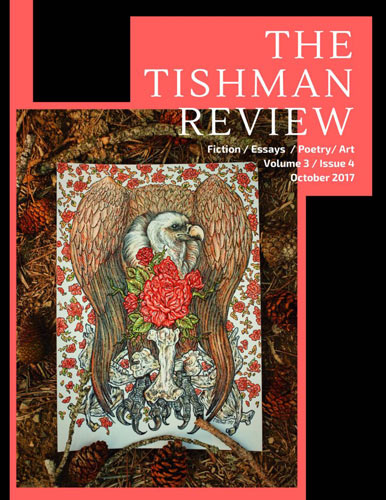The Tishman Review – October 2017
The Tishman Review is a literary magazine chock-full of the literary goods. I mean, the thing is stacked with a stunning array of quality writing.
The Tishman Review is a literary magazine chock-full of the literary goods. I mean, the thing is stacked with a stunning array of quality writing.
“The Road to Leongatha” by Alex Reece Abbott is one such story that warrants a hearty recommendation because it is such a finely wrought piece of writing. Maree and Tanya are sisters traveling with their grouchy parents to visit their grandpa. The car ride over is full of the “typical” tension family road trips are infamous for, but there’s something more at play. Over the course of the story, it slowly dawns on Maree why her parents—and her grandpa—are on edge: a troubled past life. The characterizations in this piece, specifically of the two sisters, are quite strong. Maree and Tanya are realistically rendered in both action and behavior; this is not always easy to accomplish with child characters, but Abbott does so here. Abbott has created a snapshot of a moment in a family’s life, presented a coming-of-age story for a young girl, and in prose so direct and visual that the whole thing feels effortless.
Y.L. Fein’s “Boat People” is another story that focuses on one character’s epiphanic moment, but one tinged with a bit more bluntness. Claire Gold finds herself in some academic hot water for interrupting a high-status lecture at her university. Claire takes issue with a renowned professor’s sympathetic opinion of Stalinist Russia and finds herself having to write a letter to the Dean defending herself on why she should still keep her scholarship. From this setup, Claire tries to write about her family and the story interweaves Claire’s present-day life with that of her grandparents’ lives as told to her by her mother. Claire’s inner-conflict of coming to terms with her family’s past trauma and her own identity as a Jewish woman is gripping. Y.L. Fein fills the story with believable dialogue, authentic characterizations, and an emotional frankness that makes the work a rewarding read.
A sense of emotional frankness permeates what’s probably my favorite fiction piece in the issue, “Cardboard House Paper Clothes” by Diana Clarke. In this story, a sex columnist has trouble coming up with content and attempts to draw from her current, real-life experiences. While that idea may feel overly familiar, Clarke brings a revitalizing energy to the proceedings. From the comically impromptu opening scene to the off-kilter hijinks the narrator and her paramour go through, there’s a sardonic, detached quality to the narrative that is sort of infectious. The story has a fever-dream quality to it bordering on the surreal, a refreshing approach to take for this kind of subject matter. It is a story where how it is told is as important as what it says, but what it says still matters: a nagging feeling of emptiness and lack of genuine affection may be unavoidable aspects of modern romance.
The poetry in this issue of The Tishman Review also deals with themes of identity and emotional frankness, a couple of my favorites coming from Marion Starling Boyer. In “Alfie, the Ransacker,” the speaker describes the weary life of warehouse workers and the scene is immediate and clear. I love when a poem tells a story: “Old Sarah // and Eileen try to chat up Nora / but she’s dead quiet today.” By the end of the poem the reader finds out why Nora’s “dead quiet.” It’s a straightforward poem ultimately about observation and work, simple yes, but subtly compelling where setting goes a long way.
Similarly, Boyer’s other poem “After the Telegram Comes” presents a stirring tableau of sensory images:
The air is warm there,
scented with coal fires
and the wool shoddy
tucked about the plants.
In this setting, “[c]andles flicker // atop iron poles,” and shadows of rhubarb pickers abound, a “ritual of shadows.” I love this poem because it is a perfect example of what a good title can do for a poem. All these sensory details and images create an atmosphere of vague foreboding and, factoring in the title, the reader is left to interpret this strange feeling they’re left with: what does the arrival of the telegram mean? What does it portend? Only the poet and the speaker are privy to that information. I like having my imagination fill in that gap.
Other notable pieces in this issue of The Tishman Review include Stephen Gibson’s clever poem “A Draft Page from Mary Shelley’s Frankenstein in the Bodleian Library Treasures,” a self-reflexive meditation on creation; “Crystal Box” by Megan Dausch, a succinct nonfiction piece about familial history and how we ascribe meaning to inanimate objects; and an essay on writing craft, “In Our Writing We Trust,” by Kathy Stevenson that covers in two pages the serious issue many writers grapple with sooner or later: worrying about ideas being stolen or being accused of stealing an idea in a writing group. Fascinating.
The Tishman Review is loaded with the kind of writing that will—and I’m not exaggerating here—keep readers engaged for hours.
[www.thetishmanreview.com]





